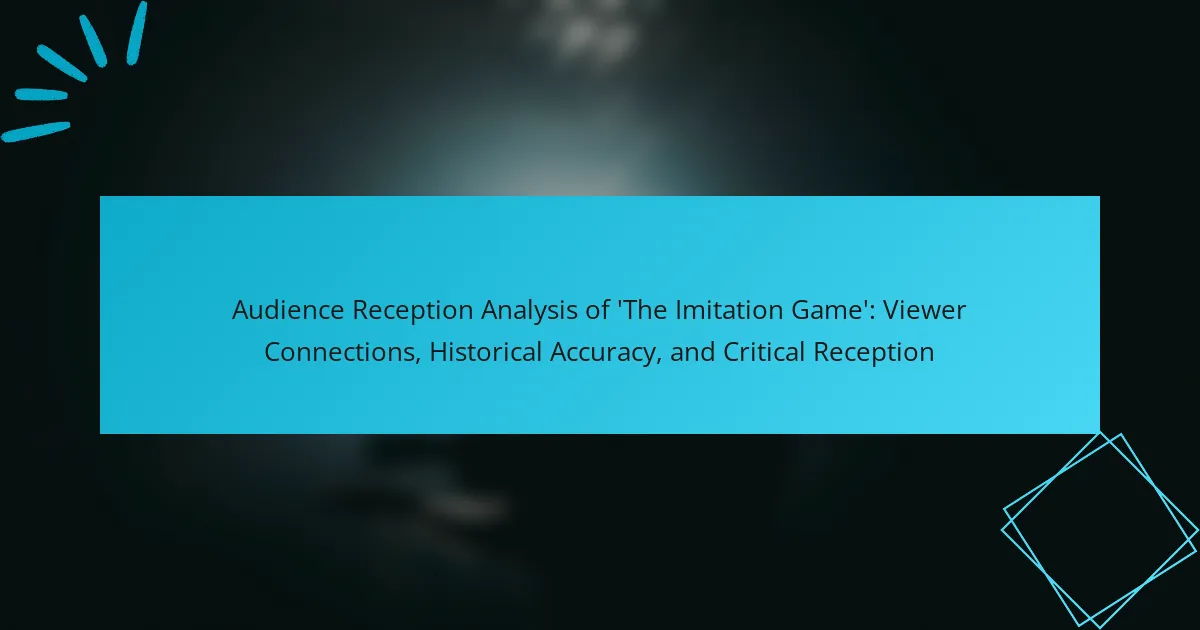
What is the audience reception analysis of ‘The Imitation Game’?
The audience reception analysis of ‘The Imitation Game’ indicates a generally positive response. Viewers praised the film for its engaging storytelling and strong performances, particularly by Benedict Cumberbatch. The film received a 91% approval rating on Rotten Tomatoes, reflecting widespread acclaim. Audiences connected with the themes of intelligence, perseverance, and social issues. However, some criticized the historical inaccuracies present in the narrative. Despite these critiques, the film sparked discussions about Alan Turing’s legacy and contributions to computing. It also highlighted the challenges faced by [censured] individuals during Turing’s time. Overall, ‘The Imitation Game’ resonated with audiences and contributed to a broader understanding of Turing’s impact.
How do viewers connect with the film’s themes and characters?
Viewers connect with the film’s themes and characters through emotional resonance and relatability. The film explores themes of genius, isolation, and societal prejudice. These themes reflect real-life struggles faced by many individuals. Viewers often identify with Alan Turing’s challenges and triumphs. The portrayal of his character evokes empathy and understanding. Additionally, the film highlights the importance of teamwork and perseverance. This connection is strengthened by the historical context of World War II. The audience sees parallels between Turing’s experiences and contemporary issues of acceptance and identity. These elements combine to create a profound connection between viewers and the film’s narrative.
What emotional responses does the film evoke in its audience?
The film evokes a range of emotional responses in its audience, including empathy, sadness, and inspiration. Viewers often feel empathy for Alan Turing, the protagonist, due to his struggles with societal acceptance and personal isolation. The depiction of Turing’s challenges elicits sadness, particularly in scenes that highlight his persecution and eventual fate. Additionally, the film inspires audiences by showcasing Turing’s genius and contributions to the Allied victory in World War II. The emotional impact is reinforced by the film’s narrative structure and character development, which create a deep connection to Turing’s story.
How do personal experiences influence viewer connections to the film?
Personal experiences significantly influence viewer connections to the film. Viewers often relate to characters or situations based on their own life events. This connection enhances emotional engagement and empathy towards the narrative. For example, someone who has faced discrimination may resonate deeply with Alan Turing’s struggles in “The Imitation Game.” Research shows that personal identification with characters leads to stronger emotional responses. A study published in the journal “Media Psychology” highlights how personal experiences shape viewer interpretations and emotional reactions. This alignment can lead to a more profound appreciation of the film’s themes and messages.
What role does historical accuracy play in audience reception?
Historical accuracy significantly influences audience reception. When a film like ‘The Imitation Game’ presents factual events, it enhances viewer engagement. Audiences tend to appreciate narratives that align with their understanding of history. Accurate portrayals can foster a sense of authenticity and trust in the film’s message. Conversely, historical inaccuracies may lead to disappointment or skepticism among viewers. For instance, critics noted deviations from real events in ‘The Imitation Game’, which sparked debate on its portrayal of Alan Turing. Research indicates that films with higher historical fidelity receive better audience ratings. This correlation suggests that accuracy directly affects viewer satisfaction and overall reception.
How does the portrayal of Alan Turing impact viewer perceptions of history?
The portrayal of Alan Turing significantly shapes viewer perceptions of history. His character in “The Imitation Game” highlights his contributions to World War II and the development of computer science. This representation emphasizes Turing’s genius and the tragic consequences of societal prejudice. Viewers may gain a deeper appreciation for the impact of his work on modern technology. The film also raises awareness about the injustices faced by [censured] individuals in history. This contextualization encourages discussions about tolerance and acceptance. Overall, Turing’s portrayal fosters a more nuanced understanding of historical narratives.
What historical events are depicted, and how accurately are they represented?
The film “The Imitation Game” depicts key historical events surrounding Alan Turing’s work during World War II. It focuses on the breaking of the Enigma code and Turing’s contributions to the development of early computers. The representation of these events is generally accurate, though some dramatic liberties are taken. For instance, the film simplifies Turing’s interactions with colleagues and portrays his personal life in a way that heightens emotional impact. Historical accounts, such as those from Andrew Hodges’ biography “Alan Turing: The Enigma,” corroborate Turing’s pivotal role in cryptography. However, the film compresses timelines and alters specific details for narrative coherence. Overall, while it captures the essence of Turing’s achievements, it sacrifices some historical nuance for storytelling purposes.
What has been the critical reception of ‘The Imitation Game’?
The critical reception of ‘The Imitation Game’ was generally positive. The film holds a 90% approval rating on Rotten Tomatoes. Critics praised Benedict Cumberbatch’s performance as Alan Turing. Many noted the film’s engaging storytelling and historical significance. It was nominated for eight Academy Awards, winning Best Adapted Screenplay. The film received mixed reviews regarding its historical accuracy. Some historians criticized its portrayal of Turing’s life and contributions. Despite this, it succeeded in raising awareness about Turing’s legacy. Overall, the film was well-received by audiences and critics alike.
What are the main points of praise and criticism from film critics?
Film critics have praised ‘The Imitation Game’ for its strong performances, particularly Benedict Cumberbatch’s portrayal of Alan Turing. Critics highlighted the film’s emotional depth and engaging storytelling. The cinematography and period details received positive remarks for their authenticity. However, criticism focused on historical inaccuracies in the portrayal of Turing’s life. Some reviewers noted the film oversimplified complex events. Others expressed concern about the film’s pacing and narrative structure. Overall, critics acknowledged its impact while pointing out significant flaws.
How do critic reviews compare to audience reviews?
Critic reviews often differ from audience reviews in tone and focus. Critics typically analyze films through artistic, technical, and thematic lenses. They consider elements like direction, cinematography, and screenplay. Audience reviews, on the other hand, reflect personal enjoyment and emotional impact. Viewers may prioritize entertainment value over technical aspects.
For “The Imitation Game,” critics praised its performances and historical context. They noted the film’s emotional depth and narrative structure. In contrast, audience reviews highlighted the film’s engaging storytelling and relatable characters. Ratings on platforms like Rotten Tomatoes show a disparity. Critics may rate films higher based on artistic merit, while audiences focus on personal resonance.
This divide illustrates varying expectations and experiences between critics and general viewers.
How do viewer connections and historical accuracy influence critical reception?
Viewer connections and historical accuracy significantly influence critical reception. Viewer connections enhance emotional engagement, leading to positive reviews. Audiences resonate with relatable characters and themes. Historical accuracy impacts credibility and authenticity perceptions. Critics often evaluate how well a film represents true events. A balance between emotional storytelling and factual representation is crucial. For instance, “The Imitation Game” received mixed reviews for its historical liberties. Critics noted that inaccuracies could detract from the film’s impact. Overall, strong viewer connections paired with accurate history can elevate critical acclaim.
What specific aspects of the film resonate most with audiences?
The specific aspects of the film that resonate most with audiences include its emotional depth, historical context, and character development. Audiences connect with the personal struggles of Alan Turing, portrayed by Benedict Cumberbatch. The film highlights themes of isolation and societal rejection, which many viewers find relatable. Additionally, the portrayal of Turing’s genius in code-breaking during World War II adds a compelling historical narrative. Critical reception indicates that audiences appreciate the balance between personal and historical storytelling. The film’s emotional impact is evidenced by its strong box office performance and positive reviews from critics.
How do the film’s narrative and character development affect viewer engagement?
The film’s narrative and character development significantly enhance viewer engagement. A compelling narrative structure keeps audiences invested in the storyline. It creates suspense and emotional connections that resonate with viewers. Character development adds depth, making protagonists relatable and their struggles compelling. For instance, Alan Turing’s portrayal reveals his vulnerabilities and strengths, fostering empathy. Research indicates that well-developed characters can increase audience identification, leading to a more immersive experience. Studies show that films with strong narratives and characters tend to achieve higher viewer ratings and emotional responses. This correlation underscores the importance of narrative and character in engaging audiences effectively.
What elements of the film contribute to its overall impact on viewers?
The film’s overall impact on viewers is influenced by its compelling storytelling, strong character development, and historical context. The narrative structure engages audiences by intertwining personal and historical events. Alan Turing’s character is portrayed with depth, evoking empathy and connection. The film’s pacing builds tension, particularly during critical moments of Turing’s work. Cinematic techniques, such as lighting and music, enhance emotional resonance. Historical accuracy grounds the story, providing a sense of authenticity. Positive critical reception further amplifies viewer interest and engagement. Collectively, these elements create a powerful viewing experience that resonates with audiences.
What lessons can be learned from the audience reception of ‘The Imitation Game’?
Audience reception of ‘The Imitation Game’ highlights several key lessons. First, viewers connect deeply with narratives that portray historical figures’ struggles. The film’s portrayal of Alan Turing’s challenges resonated with audiences, reflecting societal issues such as discrimination. Second, historical accuracy influences audience perception. While the film took creative liberties, it sparked discussions about Turing’s legacy. Third, emotional storytelling enhances viewer engagement. The film’s focus on Turing’s personal life created a strong emotional response. Lastly, representation matters. The film’s exploration of [censured] themes contributed to broader conversations about acceptance and recognition. These lessons underscore the importance of narrative, accuracy, emotion, and representation in audience reception.
How can filmmakers apply insights from audience reception analysis in future projects?
Filmmakers can apply insights from audience reception analysis by tailoring future projects to audience preferences. Understanding viewer connections helps identify which themes resonate most. Historical accuracy can be prioritized based on audience feedback regarding authenticity. Filmmakers can also adapt storytelling techniques that received positive responses. Analyzing critical reception reveals strengths and weaknesses in execution. This data-driven approach can enhance emotional engagement in future films. Audience insights can inform marketing strategies to better reach target demographics. By integrating these insights, filmmakers can create more compelling and relevant content.
What best practices can enhance audience engagement in historical films?
Incorporating authentic historical details enhances audience engagement in historical films. Accurate representation of events and figures fosters credibility. This credibility helps viewers connect emotionally with the story. Engaging storytelling techniques also play a crucial role. For instance, character development allows audiences to relate personally to historical figures. Visual elements, such as period-appropriate costumes and settings, immerse viewers in the time period. Additionally, utilizing expert consultants can ensure factual accuracy. Research shows that films with strong historical context often receive better audience ratings. For example, “The Imitation Game” was praised for its portrayal of Alan Turing’s life and contributions. These best practices create a richer viewing experience and deepen audience connections.
The main entity of the article is the audience reception analysis of the film ‘The Imitation Game.’ The article examines viewer connections to the film’s themes, character portrayals, and emotional responses, highlighting the interplay between historical accuracy and audience engagement. It discusses the critical reception of the film, noting both praise for performances, particularly by Benedict Cumberbatch, and criticism regarding historical inaccuracies. Additionally, the article emphasizes the impact of Turing’s portrayal on viewer perceptions of history and the lessons filmmakers can learn from audience feedback to enhance future projects.
